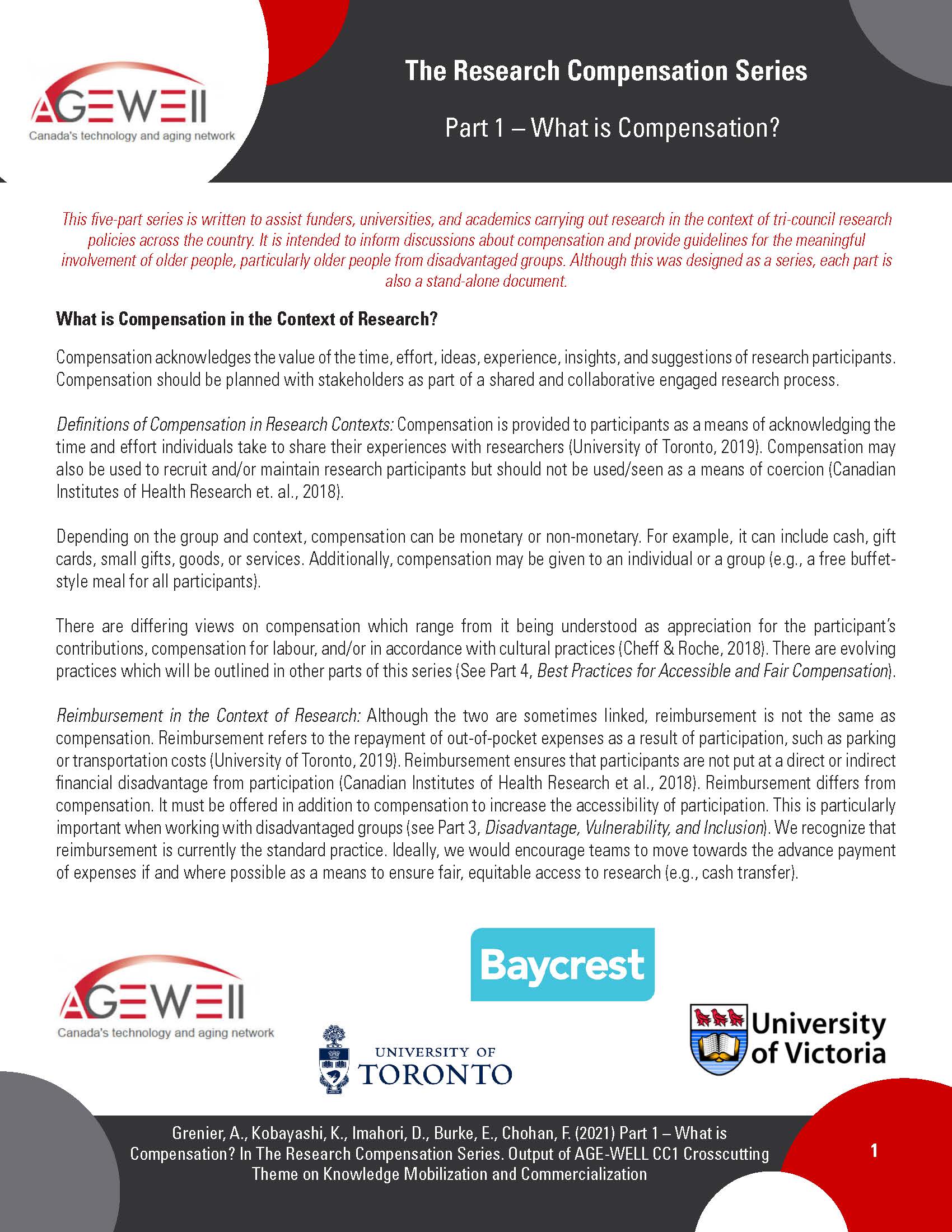The Research Compensation Series
This five-part series has been written to assist funders, universities, and academics carrying out research in the content of tri-council research policies across the country. It is intended to inform discussion about compensation and provide guidelines for the meaningful involvement of older people, particularly older people from disadvantaged groups. Although this was designed as a series, each part is also a stand-alone document.
Please find below the full compensation series and downloadable PDF files.
Part 1 – What is Compensation?
Part 1 explores compensation in the context of research and provides federal-, provincial-, and neighbourhood-level examples of guidelines surrounding compensation.
Citation:
Grenier, A., Kobayashi, K., Imahori, D., Burke, E., Chohan, F. (2021) Part 1 – What is Compensation? In The Research Compensation Series. Output of AGE-WELL CC1 Crosscutting Theme on Knowledge Mobilization and Commercialization
Part 2 – Inclusive, Equitable and Fair Practices
Part 2 asks how inclusive, equitable and fair compensation can be achieved. It provides definitions, offers considerations to ensure inclusive, equitable and fair practices of research compensation, and a real-world example.
Citation:
Grenier, A., Kobayashi, K., Imahori, D., Burke, E., Chohan, F. (2021) Part 2 –Inclusive, Equitable and Fair Practices. In The Research Compensation Series. Output of AGE-WELL CC1 Crosscutting Theme on Knowledge Mobilization and Commercialization
Part 3 – Disadvantage, Vulnerability, and Inclusion
Part 3 explores the inclusion of older people from disadvantaged groups within research and proposes seven ways to align your research compensation approach with best practices.
Citation:
Grenier, A., Kobayashi, K., Imahori, D., Burke, E., Chohan, F. (2021) Part 3 – Disadvantage, Vulnerability, and Inclusion. In The Research Compensation Series. Output of AGE-WELL CC1 Crosscutting Theme on Knowledge Mobilization and Commercialization
Part 4 – Best Practices for Accessible and Fair Compensation: Moving from Exclusion to Meaningful Inclusion
Part 4 is structured as a checklist to assist researchers when designing their compensation plan and process.
Citation:
Grenier, A., Kobayashi, K., Imahori, D., Burke, E., Chohan, F. (2021) Part 4 – Best Practices for Accessible and Fair Compensation: Moving from Exclusion to Meaningful Inclusion. In The Research Compensation Series. Output of AGE-WELL CC1 Crosscutting Theme on Knowledge Mobilization and Commercialization
Part 5 – Resources for Addressing the Challenges of Compensation in Research
Part 5 offers a list of resources addressing the challenges of compensation in research. Each resource is accompanied by a description for quick reference.
Part 5 – Resources for Addressing the Challenges of Compensation in Research
Citation:
Grenier, A., Kobayashi, K., Imahori, D., Burke, E., Chohan, F. (2021) Part 5 – Resources for Addressing the Challenges of Compensation in Research. In The Research Compensation Series. Output of AGE-WELL CC1 Crosscutting Theme on Knowledge Mobilization and Commercialization
Acknowledgments: The CC1 Team thanks the following people for their reviews and suggestions: Dorina Simeonov (AGE-WELL), Laura Tamblyn Watts (CANAGE), and Krista James (Canadian Centre for Elder Law). Thanks also to Rebecca Hessels for providing design support for the series. The development of the Compensation Series was supported by AGE-WELL as part of our work on knowledge mobilization – CC1 (Grenier and Kobayashi, 2019-2021).


Leave a Reply